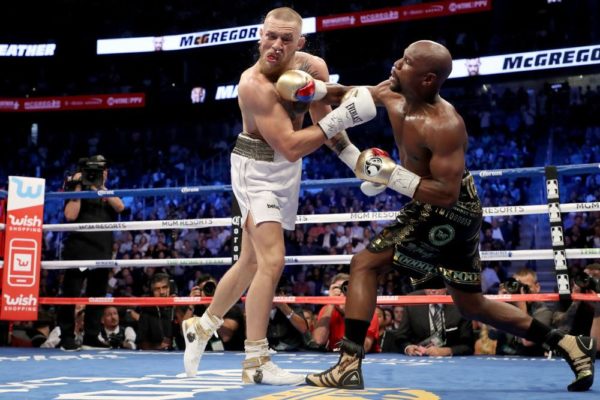News
Conor McGregor could have suffered Brain Damage had Fight Continued – Ringside Doctor

Floyd Mayweather Jr. throws a punch at Conor McGregor during their super welterweight boxing match. (Photo by Christian Petersen/Getty Images)
A former ringside doctor Darragh O’Carroll has said referee Robert Byrd, who has come under fire recently for what some have described as prematurely ending the Mayweather/McGregor fight, was right to do so, as McGregor could have suffered brain damage had the fight continued.
Conor McGregor had complained about Hall of Fame referee Robert Byrd ending his match against Floyd Mayweather too soon, as he hadn’t gone down. He said:
I would have liked to see the end of the 10th… I have this patch where I must overcome, I get a little wobbly, but it’s more fatigue. If you look at the Diaz 2 fight, I came through that.
It’s not damage, there’s always a patch in my fights where I go through this fatigue stage… but I wasn’t rocked.
But O’Carroll, in Tonic, said any ringside doctor would agree that Byrd was right to end the match, as McGregor was showing signs of mild brain damage. He said:
Byrd’s calculation to call a stoppage was likely not based on signs of fatigue, but rather signs of traumatic brain injury.
Ataxia, or dizziness and loss of balance, is one of the hallmarks of concussion, a type of mild traumatic brain injury.
Fatigue may cause sluggish and slow movements, but does not cause the imbalance and poor coordination exhibited by McGregor in the 10th round.
Being wobbly, in the setting of pugilistic trauma, will always be treated as the result of head trauma and not as fatigue.
To let a fighter continue on would be grossly negligent.
He added that the referee did an excellent job stopping the match when he did, saying:
Continuing the fight would have put McGregor at risk for continued head trauma, risking a future of chronic traumatic encephalopathy, or at worst, repetitive damage leading to a severe traumatic brain injury such as a brain bleed.
It wouldn’t be the first time a boxer experienced this, as was tragically the case just this year to young Daniel Franco, who required emergency neurosurgery to save his life.
Photo Credit: Christian Petersen/Getty Images





















